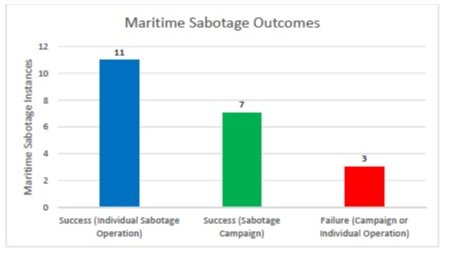
JUST OUT! My team @CNA_org just completed a quick-look project – led by Alex Powell – looking at lessons from historical examples of #maritime #sabotage for #StrategicCompetition. I’ll summarize some key findings & implications in this THREAD. 1/n
@CNA_org The impetus for this study was discussions w/various #SOF entities as well as the call for work in this area by the Joint Special Operations University in its 2021 “Special Operations Research Topics” guide: jsou.libguides.com/ld.php?content… 3/n
@CNA_org JSOU called for a study on “strategic sabotage,” but we recognized (a) a number of war college theses have already examined this aspect & (b) those efforts focused on land-based sabotage. So, we focused our study on sabotage in or emanating from the *maritime domain.* 4/n
@CNA_org Of note, #DOD doesn’t currently have a formal definition for “sabotage,” having removed that term from its official dictionary in 2016. So, we created one that we believe captures the salient aspects of a variety of different definitions.
(Cc @ElenaWicker) 5/n
(Cc @ElenaWicker) 5/n

@CNA_org @ElenaWicker We identified 21 open source examples of maritime sabotage & coded them according to 25 variables. The latter were chosen for descriptive reasons & to test specific hypotheses that we formulated about sabotage operations. 6/n
@CNA_org @ElenaWicker As this chart shows, about half the examples of #sabotage we found occurred during #WWII, but the other half spanned the decades since then. 7/n 

@CNA_org @ElenaWicker We found that 18 of the 21 examples occurred in the context of large-scale combat ops, while only 3 occurred in other parts of the range of military operations (ROMO). 8/n 

@CNA_org @ElenaWicker We also found that 18 of the 21 examples were successful in accomplishing their desired aims. 11 of these were successful #sabotage events; 7 of them were successful sabotage campaigns. 9/n 

@CNA_org @ElenaWicker In terms of the forces involved, 13 of the 21 examples involved #SOF or SOF-like entities; the other 8 were conducted by conventional forces. 10/n 

@CNA_org @ElenaWicker We tested a number of specific hypotheses in our study. Of these, interesting results included the idea that #sabotage ops incurring third-party collateral damage tend to result in significant negative political consequences. 11/n
@CNA_org @ElenaWicker We also found that the element of surprise may be less important for successful #sabotage operations than one might assume, & that complex sabotage ops are less likely to succeed than simple ones. 12/n
@CNA_org @ElenaWicker Some implications of this quick-look effort:
- #DOD should re-establish a definition for #sabotage & explore if it warrants a distinct theory or operational concept
- #DOD should examine sabotage from single event & campaign perspectives IOT understand pros/cons of each 13/n
- #DOD should re-establish a definition for #sabotage & explore if it warrants a distinct theory or operational concept
- #DOD should examine sabotage from single event & campaign perspectives IOT understand pros/cons of each 13/n
@CNA_org @ElenaWicker - #DOD should think more deeply about #sabotage outside of large-scale combat ops (eg, is it an appropriate tool for competition? If so, under what conditions & w/what risks?)
- #DOD should examine in more depth the idea of multi- & cross-domain sabotage 14/n
- #DOD should examine in more depth the idea of multi- & cross-domain sabotage 14/n
@CNA_org @ElenaWicker Conclusion: This wasn’t meant to be a comprehensive study & we offer more Qs than As in it. BUT, to our knowledge it remains the first/only study of maritime #sabotage specifically & so will hopefully serve as a springboard for future work: CALLIN' ALL Y'ALL!
15/15
15/15
cc @DavidMaxwell161 @SOFFru1 @JackMurphyRGR @wesleysmorgan @SeanDNaylor @NatSecMulligan @UticaEric @RobinsonEricD @AtwellKyle @MarkMoyar @andymilburn8 @NavySEALfnd @NavySEALMuseum @NavySEALfrogmen @MARSOCofficial @SOFNewsUpdate @GlobalSOF @sofrepofficial @NATO_SOF @USASOCNews
• • •
Missing some Tweet in this thread? You can try to
force a refresh







